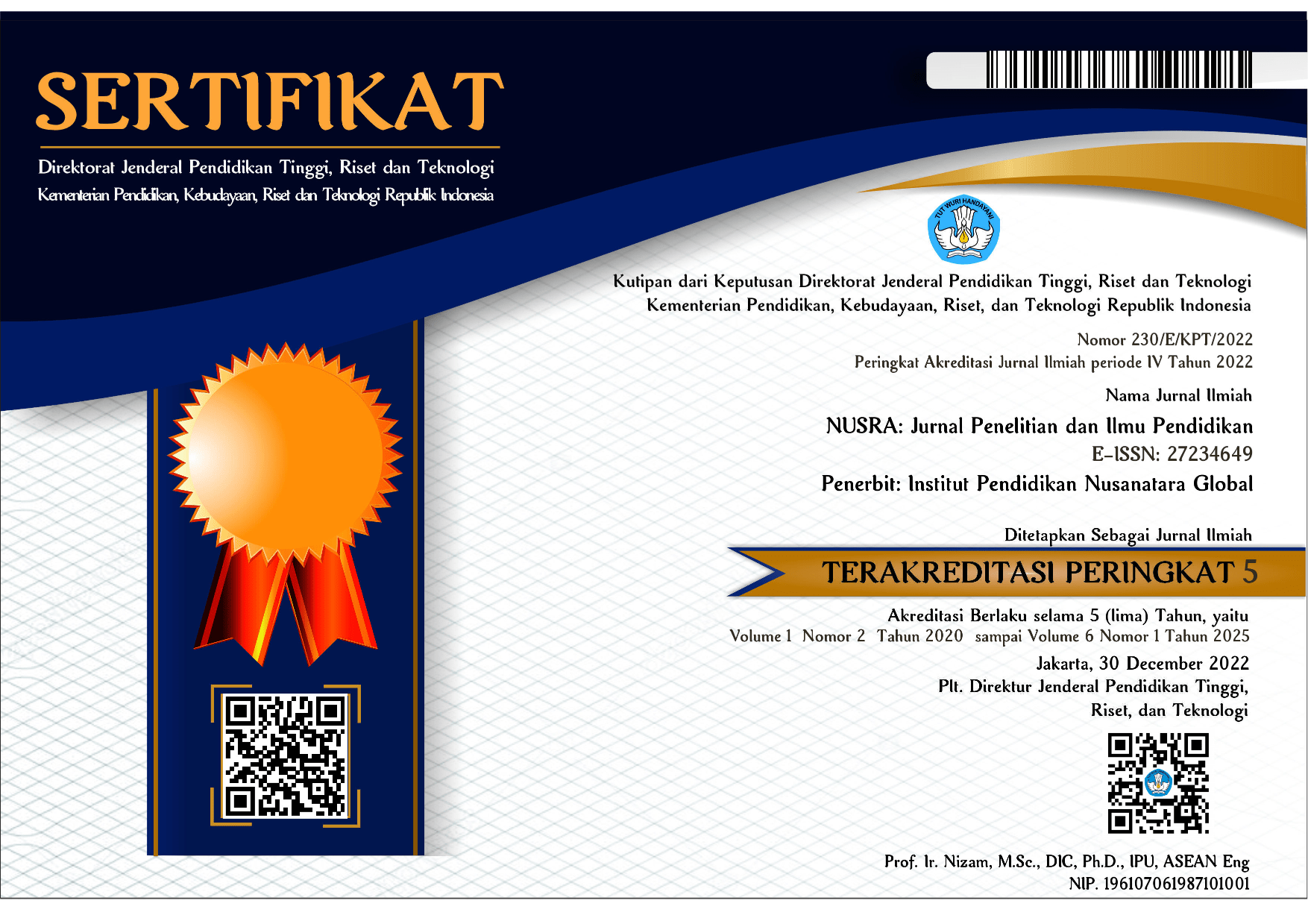APPRAISAL ATTITUDE ON EDITORIAL NEWS: OUR DISASTROUS PRESIDENT
DOI:
https://doi.org/10.55681/nusra.v4i3.1192Keywords:
Appraisal, Appraisal Attitude, News EditorialAbstract
Appraisal Theory's linguistic discourse analysis gives different techniques to analyze "objectivity" and ideological bias in news editorial. Systemic Functional Linguistics (SFL) describes the way in which language constructs attitude, and allows speakers or writer to place themselves in relation to prospective responses or other speakers/writers in terms of how they value their opinions. The study was aimed to know existing of appraisal attitude system in news editorial and to figure out the dominant types of appraisal in the Los Angeles Times News Editorial convey the meaning of the sentence. The writer look at the creation of journalistic reality from a linguistic point of view, how the choices journalists make in terms of vocabulary reveal their ideological standing, both in terms of content and context. For this purpose the writers using the Los Angeles Times editorial which published in January 17th 2021 as an example, this chapter applies the framework an appraisal. Since these articles make connection to President Donald J. Trump. It activate powerful evaluation of appraisal attitude values that provide news articles evaluative implications that observed. The news editorial system draws attention to the importance of emotion, judgment and appreciation in its coverage of problems. As a results, the study showed that performance in appraisal system in Los Angeles Times news editorial is almost in entire text the writer give some lexical items that give “affect” to the reader. In this case is negative affect. And then, the writer intends to give less attention on appreciation lexical items.
Downloads
References
Aloy Mayo, M., & Taboada, M. (2017). Evaluation in political discourse addressed to women: Appraisal analysis of Cosmopolitan’s online coverage of the 2014 US midterm elections. Discourse, Context and Media, 18, 40–48. https://doi.org/10.1016/j.dcm.2017.06.003
Asad, S., Noor, S. N. F. B. M., Indah, R. N., & Jaes, L. Bin. (2021). Attitude realization in news reports: An interpretation through an appraisal analysis. Indonesian Journal of Applied Linguistics, 11(1), 177–186. https://doi.org/10.17509/IJAL.V11I1.34622
Badklang, C., & Srinon, U. (2018). Analysis of attitudinal resources in an EFL university classroom talk in the deep South of Thailand: An appraisal perspective. The New English Teacher, 12(2), 106–128. http://www.assumptionjournal.au.edu/index.php/newEnglishTeacher/article/view/3239
Chen, D., & Shuo, Z. (2018). Analysis of interpersonal function in speech—A case study in obama’s WHCD address. International Journal of Liberal Arts and Social Science, 6(8), 31–40. https://ijlass.org/data/frontImages/articles/Vol.6No.8/4.31-40.pdf
Daulay, F. Y. (2010). Appraisal in the inaugural addresses of the presidents of America from Bush senior to Obama.
Ekawati, R. (2015). Language appraisal on attitudinal systems for exploring ideology in death penalty in Sydney Morning Herald and Herald Sun editorials. Humaniora, 27(3), 362–372.
Enggins, S., & Diana, S. (1997). Analysing casual conversation. London: Cassell. Cassell.
Fitriati, S. W., Solihah, Y. A., & Tusino, T. (2018). Expressions of attitudes in students’ narrative writing: An Appraisal Analysis. Lingua Cultura, 12(4), 333. https://doi.org/10.21512/lc.v12i4.4789
Ghasani, B. I., & Sofwan, A. (2017). Appraisal and speech structure of contestants’ speeches in speech contest of ESA WEEK Competition. English Education Journal, 7(2), 152–159. https://doi.org/10.15294/eej.v7i2.15738
Halliday, M. A. K., & Matthiessen, C. M. I. M. (2014). Halliday’s introduction to functional grammar: Fourth edition. In Halliday’s Introduction to Functional Grammar: Fourth Edition. Oxon: Routledge. https://doi.org/10.4324/9780203431269
Hayif Sameer, I. (2017). Rhetorical and Linguistic analysis of Bush’s second inaugural speech. Advances in Language and Literary Studies, 8(1), 44. https://doi.org/10.7575/aiac.alls.v.8n.1p.44
Hommerberg, C., & Don, A. (2015). Appraisal and the language of wine appreciation. Functions of Language, 22(2), 161–191. https://doi.org/10.1075/fol.22.2.01hom
Jabbar, D. A., & Haryudin, A. (2020). An Analysis of deixis on Anies Baswedan’s speech about condolences for the city of Christchurch, New Zealand. PROJECT (Professional Journal of English Education), 3(6), 771. https://doi.org/10.22460/project.v3i6.p771-776
Khoo, C. S. G., Nourbakhsh, A., & Na, J. C. (2012). Sentiment analysis of online news text: A case study of appraisal theory. Online Information Review, 36(6), 858–878. https://doi.org/10.1108/14684521211287936
LIMA-LOPES, R. E. (2020). Immigration and the context of brexit: Collocate Network and Multidimensional Frameworks Applied To Appraisal in Sfl. Muitas Vozes, 09(01), 410–441. https://doi.org/10.5212/muitasvozes.v.9i1.0024
M. A. K. Halliday. (1985). Language, Context, And Text Aspects of Language in a Social-Semiotic Perspective. Oxford: Oxford University Press.
Maarif, A. S., Ali-Fauzi, I., & Panggabean, S. R. (2010). Politik identitas dan masa depan pluralisme kita. Centre for the Study of Islam and Democracy.
Martin, J. R., & Rose, D. (2003). Working With Discourse: Meaning Beyond The Clause. London: Continuum.
Martin, James R. (2004). English Text: System and Structure. In A Study of Concepts. Beijing: Peking University Press.
Parvin, L. M. (2017). CDA Undertaken through SFL: Employment of appraisal in critical discourse analysis of the news. International Journal of Linguistics and Literature, 6(4), 23–30.
Pasaribu, T. A. (2020). Appraisal framework in analyzing learners’ attitudinal resources on performing of mice and men. Indonesian Journal of EFL and Linguistics, 5(1), 161. https://doi.org/10.21462/ijefl.v5i1.237
Rico, G., Guinjoan, M., & Anduiza, E. (2017). The Emotional underpinnings of populism: how anger and fear affect populist attitudes. Swiss Political Science Review, 23(4), 444–461. https://doi.org/10.1111/spsr.12261
Sabao, C. (2016). Arguments for an appraisal linguistic discourse approach to the analysis of “objectivity” in “hard” news reports. African Journalism Studies, 37(1), 40–63. https://doi.org/10.1080/23743670.2015.1095776
Suryaningtyas, V. W., Nugroho, R. A., Cahyono, S. P., Nababan, M. R., & Santosa, R. (2019). Appraisal in Bilingual tourism information media: developing an SFL-Based Translation Model. ASIAN TEFL Journal of Language Teaching and Applied Linguistics, 4(1). https://doi.org/10.21462/asiantefl.v4i1.65
Umiyati, M. (2019). International Journal of Systemic Functional Linguistics Textual Metafunction in Donald Trump ’ s Speech “ Recognizing Jerusalem as Israel ’ s Capital ”. 2(2), 0–5.
Wang, M. (2017). A Study on College English Majors’ Writings from the perspective of appraisal theory. Theory and Practice in Language Studies, 7(9), 756–763. http://www.academypublication.com/ojs/index.php/tpls/article/view/tpls0709756763/1240
Wiannastiti, M. (2010). Narrative discourse analysis of a foreigner’s story during his work in indonesia. Lingua Cultura, 4(1), 39–50.
Zhang, Y. (2018). Attitudinal Analysis of president XI’s remarks at press conference of BRICS Xiamen Summit from the Perspective of Appraisal Theory. Journal of Language Teaching and Research, 9(2),
Downloads
Published
How to Cite
Issue
Section
License
Copyright (c) 2023 NUSRA: Jurnal Penelitian dan Ilmu Pendidikan

This work is licensed under a Creative Commons Attribution-ShareAlike 4.0 International License.














